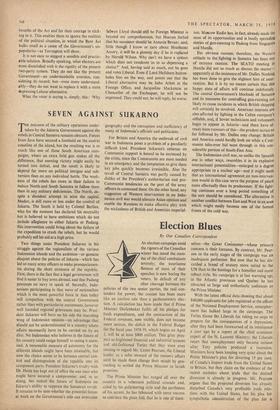Election Blues
By Our Canadian Correspondent
*AN election campaign amid the rigours of the Canadian winter has taxed the stam- ina of the chief combatants severely; the wearisome flatness of most of their speeches is now boring the voters. In default of any clear cleavage between the policies of the two senior parties, the real con- tenders for power, the contest has been more like an auction sale than a parliamentary elec- tion. A calculation has been made that if Prime Minister Diefenbaker fulfils all his pledges for fresh expenditures, and the contraction of the Federal revenues, now visible, does not become more serious, the deficit in the Federal Budget for the fiscal year 1958-59, which begins on April 1, will be at least $800 million. This grim pros- pect so frightened financial and industrial tycoons and old-fashioned Tories that they were even coming to regard Mr. Lester Pearson, the Liberal leader, as a safer steward of the nation's affairs until he made them change their minds by pro- ceeding to outbid the Prime Minister in lavish promises.
The Prime Minister has ranged all over the country in a vehement political crusade and, aided by his pulpiteering style and the earthiness of his accent, he has laboured with some success to convince the plain folk that he is one of them- selves—the Great Commoner—whose primary concern is their fortunes. By contrast, Mr. Pear- son in the early stages of the campaign was an inadequate performer. But now that he has dis- carded a brand of oratory more suited to the UN than to the hustings for a homelier and more robust style, his campaign is at last warming up; in the Atlantic provinces and Quebec he has attracted as large and enthusiastic audiences as the Prime Minister.
With the latest official data showing that about 840,000 applicants for jobs registered at the offices of the National Employment Service, unemploy- ment has bulked large in the campaign. The Tories blame the Liberals for taking no steps to prepare for the consequences of a depression, after they had been forewarned of its imminence a year ago by a report of the chief economic expert of the St. Laurent Ministry; the Liberals retort that unemployment only became serious after Tory policies produced a recession. Ministers have been keeping very quiet about the Prime Minister's plan for diverting 15 per cent. of Canada's import trade from the United States to Britain, but they claim on the evidence of the recent statistics about trade that the desired diversion is already in progress. Mr. Pearson argues that the projected diversion has already disturbed Canada's very profitable trade rela- tions with the United States, but his plea for sympathetic consideration of the plan for a free-trade union between Canada and Britain is at variance with pronouncements of one of his chief French-Canadian lieutenants, who has denounced the work of the recent Canadian trade mission to Britain on the ground that it has eraouraged a greater inflow of imports from Britain and thereby increased unemployment in Canada.
The key provinces in the election are Quebec and British Columbia. In the other eight pro- vinces some seats will change hands, but with no serious effect upon the balance of parties. The Tory Party must secure a substantial increase of its present quota in Quebec—nine out of seventy-five seats—to get a working majority; and hopes for its attainment have been raised by the size and enthusiasm of Mr. Diefenbaker's audiences and the keener competition for Tory nominations than in 1957. But the three Tory Ministers from Quebec have little influence out- side their own districts; whereas Mr. Pearson commands the services of a much more formid- able team of experienced French-Canadian cam- paigners. The Liberals discern no evidence of a serious drift to their opponents, but they admit the possibility that some of their former sup- porters, realising that Mr. Diefenbaker has won an ascendancy in the English-speaking provinces, may decide to jump upon his band-wagon in order to increase French-Canadian influence in the councils of his Government.
In British Columbia the Tories hope to double their present quota of nine out of its twenty-two seats by the return of disillusioned Social Crediters to their original fold. And in all the provinces the Diefenbaker Ministry seems likely to profit by a feeling among the independent voters, who are quite numerous, that Mr. Pear- son and the Liberal Party should be given time to learn the proper functions :of an opposition, and to formulate a coherent progressive pro- gramme; and that, therefore, the Tories should have a further trial in power with a working majority.



































 Previous page
Previous page